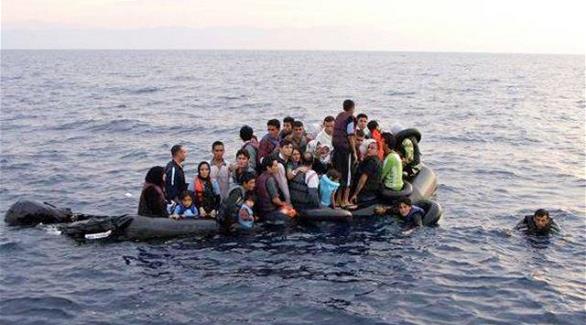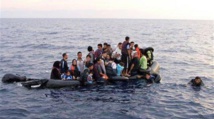High above Lesbos, once a paradise for holidaymakers, the sky is turning a pale pink. You can hear the refugee camp and the surrounding slum waking up: The deep rattling coughs are as much a part of life here as the dirt and stray cats.
Moria is supposed to house 3,000 refugees – but 13,000 people now live in and around the former prison.
Last Sunday, the situation escalated further - refugees started fires in two places and then stopped the fire brigade from extinguishing the flames. The thinking was that if Moria burns down, then they would have to be brought to the mainland.
A woman died in the fire, but soon the depressing everyday life returned to the camp.
In the mornings, as the first refugee children with dripping noses and wearing worn-out plastic shoes crawl out of the tents, hotelier Giorgos prepares breakfast for his guests a few dozen kilometres further north.
His family business, the Hotel Gorgona in the picturesque fishing village of Skala Sikamineas, is located near the point that refugees head for when they make their way from Turkey.
Since the beginning of the refugee crisis in 2015, when waves of migrants from conflict-ridden Middle Eastern and North African countries were streaming towards Europe via Turkey, everything here has changed.
First, thousands of traumatized, soaked, desperate people walked through the village day after day.
Then the pope came to visit, followed by international politicians and celebrities like the actress Angelina Jolie. But the tourists stayed away.
The inhabitants of Lesbos were nominated for the Nobel Peace Prize for their actions - only to be forgotten after a refugee pact between the EU and Turkey came into force. Under the terms of the deal, Turkey is now hosting millions of migrants from the region, especially Syria.
Yet for the islanders, things have still not returned to normal.
There is hardly a fisherman in Skala Sikamineas who has not already rescued people at sea or discovered a drowned body. Some have even found a corpse on their fish hook.
"It happened to me," says Michalis, a 74-year-old fisherman. "I pulled and pulled and thought, it's heavy! I had him by the jacket." If fishermen report the body to the port police "we will be questioned for days and our boats will be detained," he explains.
Therefore, many simply cut the line, says Michalis and looks away, back to the sea and the Turkish coast, only about five nautical miles away.
Greece last month warned that the pace of migrant arrivals from Turkey to Greece was growing, bringing overcrowding on islands like Lesbos.
"Hatred of refugees does not really exist here, we Greeks don’t forget our humanity easily," says hotelier Giorgos. Nevertheless, there are limits to the islanders’ patience. "You have to understand that - yes, they are human beings, but we are human beings too."
Lesbos used to make its money from tourism, now the main source of income is endless suffering and misery. "No tourist wants to enjoy their breakfast while rows of barefoot, soaked refugees are creeping past."
The biggest worry on the island is the dirt and germs. "We are sitting on a powder keg. Everyone is afraid that there will be an epidemic in Moria with all the bacteria and viruses. When that happens, I don't want to imagine how the inhabitants will react," says Giorgos.
Local resistance has so far prevented the construction of another refugee camp, which could defuse the situation in Moria. People fear that this would make their island home into a permanent refugee camp.
Mustafa and his wife are sitting with their three coughing children amidst the dirt. The 29-year-old Afghan shows pictures on his mobile phone of happier times when he worked as a stonemason in Iran. When the authorities unexpectedly deported his family back to Afghanistan they set off for Europe.
Mustafa clicks on pictures of the Taliban, bombs and terror and points to his children - should they grow up with this?
But when he left, he couldn’t have imagined the makeshift, dirty camp on Lesbos. It currently takes seven months for an asylum application to even be processed due to a lack of staff. The new conservative Greek government wants to address this to speed up the process. And it is abolishing asylum seekers’ right to an appeal if they are at first rejected.
Syriza, the left-wing party now in opposition, is critical of this step. When it was in government, it shied away from rejecting asylum applications and sending people back, even though that is entailed in the EU-Turkey agreement.
Since 2016, only about 2,000 migrants have been returned.
What other possible solutions are there? When residents of Lesbos are asked, they shrug their shoulders helplessly.
The unanimous opinion is that they are the ones paying for the actions of the big politicians: they cite weapons deals, interest in oil, the resulting wars and refugee flows.
People here are also disillusioned with the EU. "For them, we are simply the most convenient solution.”
-------------------------------------------------------------------------------------------------------









 Home
Home Politics
Politics











